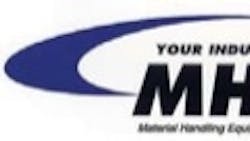The Material Handling Equipment Distributors Association (MHEDA, www.mheda.org) is in the process of launching an effort to bridge the gap between academia and industry. It's called the Gateway Program and it's designed, as the name implies, to provide a point of entry for students into the material handling industry.
"We plan to accomplish two things," says Mike Romano, president and CEO, Associated Material Handling Industries (Carol Stream, Ill., www.associated-allied.net) and chairman of MHEDA's Industry Advocacy commit tee. "First, we need to attract new talent to our industry to support our growth, and to contribute to the continuous improvement of our industry."
Secondarily, he says, as we educate all students, even if they're not attracted to a career in material handling, it will create a higher level of awareness and appreciation for the value of what material handling is all about. "They might end up in some other business or career and they'll have knowledge of material handling."
This long-term strategic thinking is important for promoting the longevity of the industry, he adds.
Liz Richards, MHEDA's executive vice president, says the genesis of the program came from the association's industry advocacy committee about a year ago, however, it really began to gel only this spring. To help de?ne the needs, or program, MHEDA brought representatives from schools to its convention last spring. The guests included professors from four colleges, along with two students from each school. The guests were from a range of disciplines.
"We had [representatives from] the school of engineering at the University of Buffalo [New York], Clark son University's [Potsdam, N.Y.] inter-disciplinary management program, University of Tennessee's [Knoxville] department of marketing and logistics, and Texas A&M [College Station] industrial distribution school."
The idea, says Richards, was to expose these people and their schools to the material handling industry. After the guests had participated in the convention, members of the advocacy committee sat down with them to review plans for the Gateway program.
"Our focus," says Romano, "has been on the demand side of this issue--what are the needs of the educational institutions for knowledge of our industry."
He says now that the committee has a handle on what academia needs, the job is to go back and see what is avail able on the supply side of the equation. "We now have to determine if the level of support mechanisms is sufficient for us to meet the demand, and if so, at what level."
Lessons learned
Reviewing the program with students and academicians provided insight the committee might not otherwise have had. "We've long thought academic sup port--scholarships--was what students were after," says Richards. "What we were told, what they would prefer, is exposure and experience [within the industry], available via scholarship to an industry event."
Events such as ProMat or the North American Material Handling shows, sponsored by Material Handling Industries America (MHIA), or industry conferences offer more value to students that previously thought. "Exposure to the business they gain coming to an event has more value than a scholarship of a couple thousand dollars," says Richards.
Another area students value is case studies, she says. They learn from applications of the equipment and theories.
"Our next big step will be to send a comprehensive survey to our members," says Richards, "to determine what they might already be offering to students." She's most interested in learning of internships and co-op programs that might already be in place. Knowing what already works--or does not work--can save the association's committee a lot of time as it formalizes its program.
"We need to know how members find students, for example," says Richards. "And how effective is posting positions on Web sites."
Another key role for association members will be their willingness to make guest lectures at selected colleges, or offer tours of facilities where they have installed equipment.
Richards adds that since students value the real-world experiences, the association will be collecting case histories that will be put into a repository for them to review.
An early step in the Gateway process will be a resume-posting module that will be available at the association's Web site. It will allow students to post resumes and members to search for students if they have jobs or internships available.
As with any association, Romano predicts members will quickly agree to the passive aspects of the program, and be hesitant to adopt initiatives that take more effort. "Giving a lecture at a university or participating in a career fair requires a deeper commitment than does searching a Web site for a candidate."
He says he knows that members, in general, will embrace the Gateway initiative because it touches on issues all distributors have--finding qualified employees.
Romano says the Gateway Program is a top initiative for the association in 2008. Speaking in terms of an equipment distributor, he says MHEDA will be bringing the program to market next year. "My feeling," he says, "is that it will begin in test markets rather than a national roll out. We're going to do this right. If that means taking smaller steps in the beginning, that's what we'll do."
The reasoning behind a test-market approach, he adds, has more to do with the supply side rather than the demand side. Finding other member distributors in the association willing to do guest lectures or provide those tours of facilities will be the challenge.
"If any company is already doing something like this," says Richards, "we'd love to hear about it. They can call us [(847) 680-3500)] anytime and tell us what's working and what's not working. We're designing the most comprehensive program of any association in industry, so we're open for suggestions."
